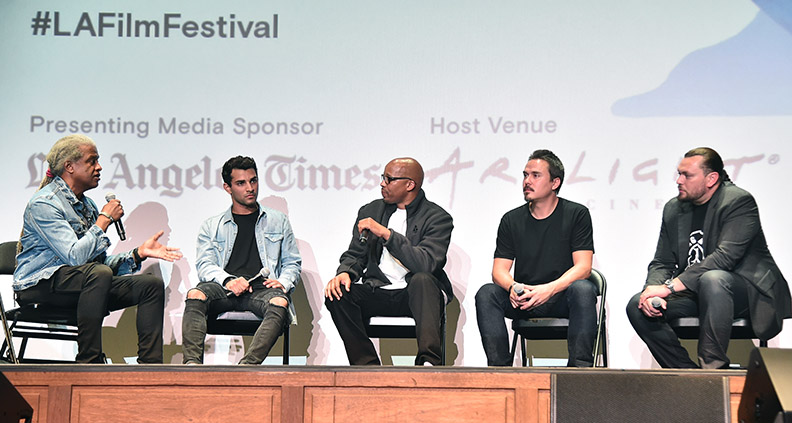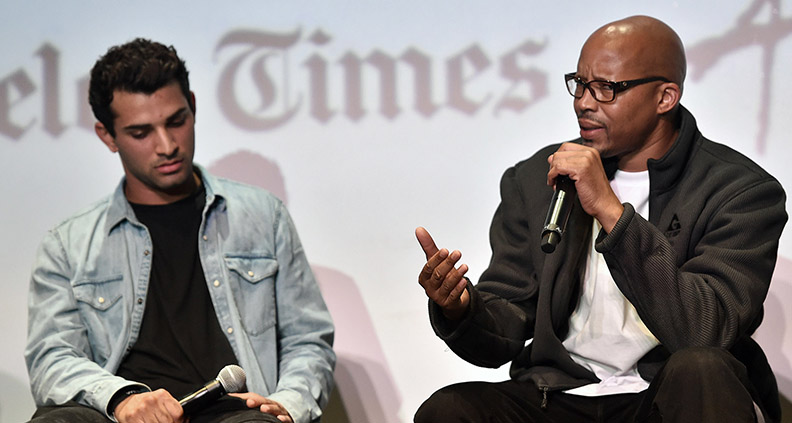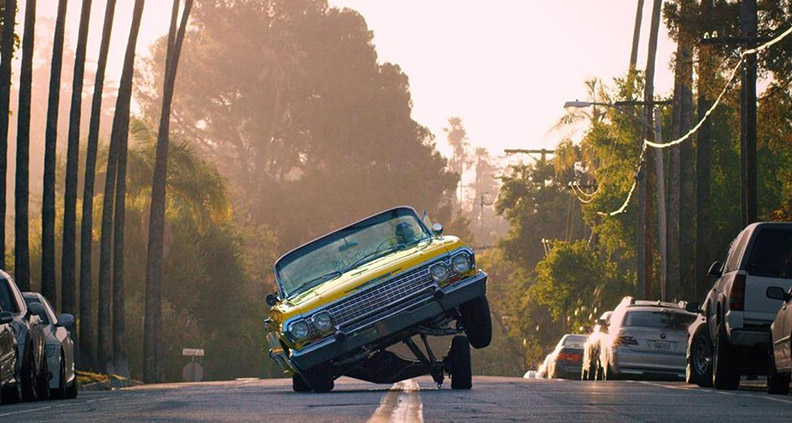Warren G Regulates at LA Film Festival with ‘G-Funk’ Doc Premiere and Live Performance
Regulators… Mount up! Let me hear you say Ooo, ahh/summertime in the LBC! Okay, well, technically DTLA—but you get it. On the clear black night of Day Three at the LA Film Festival on June 16, hip-hop fans gathered at the Theater at the ACE Hotel downtown for the LA premiere of G-Funk, a long-in-the-works documentary showcasing rapper Warren G and the influences of “G-Funk”—the popular rap subgenre that continues to embody West Coast hip-hop culture.
Produced by Warren G himself and directed by 23-year-old newcomer Karam Gill, the film includes nostalgic footage—most poignantly, clips of the Warren G’s frequent collaborator Nate Dogg, who passed away in 2011—as well as numerous interviews with respected rappers and artists and industry icons such as Snoop Dogg, Ice Cube, Ice-T, Kurupt, Too Short and Russell Simmons.
The film outlined how G-Funk (short for Gangsta-Funk) was heavily influenced by soul pioneer George Clinton’s Parliament-Funkadelic collective. In fact, much respect was paid to soul and funk music of the 1970s—a deep source of G-Funk’s inspiration, being the music that many of the interviewees grew up on.

Immediately following the screening, Film Independent Curator Elvis Mitchell moderated a conversation with Warren G, Gill and G-Funk producers Gary Ousdhal and Rafael Chavez.
The panel began by sharing their connection to Gill, who first met Warren G when he was only 20 years old. Impressed by Gill’s talents, Warren decided to bring him on to help document the underreported chapter in West Coast hip hop, and the rest was history (literally—Warren been avidly archiving footage throughout his career and life).
Ousdhal and Chavez had already been working in the film industry for a couple of years when Warren G first introduced them to Gill. At first, the producers were a little reluctant to hand over the reigns of the project to such a young filmmaker, unsure of his ability to properly document an era he was barely even alive in. But youth and inexperience aside, Gill brought his A-game (complete with storyboards!) every day, demonstrating a dedication to work to make the film a reality.
Ousdhal said that he and the other producers were shocked when Gill sent the first cut of the film—it blew them away (having made a few other films before, Ousdhal said he’s used to first cuts being pretty rough.) And Gill continued to impress them throughout the production.

“This guy is incredible,” said Warren G of Gill. “I’ve been looking for somebody to really lay out the story like I want it to be laid out” he said, saying that a lot of potential collaborators got back to him about directing this project, but that they wanted to change things in ways he didn’t approve of. Although the rapper had to school Gill on a few things as he began to share his background story with him, Gill ultimately matched up how Warren G and the crew wanted the story to be told: all truth.
Warren G compared the filming process to that of producing an album. “If you’re any good at hip-hop, you’re a storyteller,” Mitchell said, referring to how the creativity flowed while putting the film together.
“If you look at G-Funk as a type of music, it’s very melodic and slow. There’s no choppiness,” Gill said. “What mimics that really nicely are the interviews. The story is constantly flowing and narrating [what we’re seeing] with sound.” Gill also said that he thought the use of a narrator would have felt forced, that ultimately G-Funk was about piecing many different perspectives together to help the story flow seamlessly—hence the many, many interviewees that contributed to the final product.

Gill said that overall, the film conducted about a six-hour interview with Warren, who holds together the backbone of G-Funk’s narrative. Chavez said there were artists that they unfortunately couldn’t get on camera, but everyone they did get was “on the strength” on their primary subject. None of the interviewees were paid, demonstrating just how much love Warren G continues to receive from his peers.
G-Funk is a documentary about West Coast hip-hop. So naturally, the LA-area crowd (including SoCal NBA super-fan Clipper Darrell) responded to the Q&A incredibly enthusiastically. The panel agreed that there hadn’t been an audience like the one in LA, with Gill added that ACE crowd was the film’s best thus far.
“I just wanted to see it with people and how they reacted to real shit,” Warren said, happy that the audience enjoyed watching his story as much as he enjoyed telling it and having it told—a fact that proved true when an audience member shouted “West Coast is the best coast!” and the audience agreed in a cheerful applause.
Before the stage was cleared to let Warren G perform a short set of his greatest hits (including—yes—“Regulators”) Gill ended the conversation on a note of gratitude. “It’s a testament to everyone in this G-Funk family and how far everyone has come individually,” Gill said of those involved in the film. Or just maybe, it really ain’t nothin’ but a G thang, baby.
The 2017 LA Film Festival is currently underway, June 14—22, headquartered at the ArcLight Cinemas Culver City, with additional screenings at ArcLight Hollywood, ArcLight Santa Monica, LACMA and The Theatre at Ace Hotel. Check out the Festival Guide here.
Stay tuned to our Twitter, Facebook and Instagram for the latest new additions and updates. And don’t forget to subscribe to our YouTube channel for more exciting announcements. Tickets and passes are on sale now.
Sold out screenings? Get in with a Festival pass. In addition to screenings and special events (even when sold out) Festival passes provide entry to our super-fun Festival Lounge, featuring a 21+ hosted bar and the opportunity to rub shoulders with Festival filmmakers and other film industry professionals. Buy yours. Film Independent Members save up to 25%.